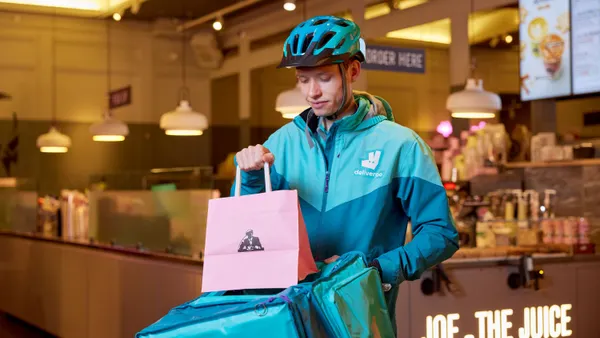Dive Brief:
- International delivery giant Deliveroo has opened its first brick-and-mortar restaurant in Hong Kong. According to CNBC, the new unit will serve both online and in-store customers from 15 dining concepts. If the format performs well, the delivery company will take the concept global, and there are plans to open a location in Singapore in 2019.
- The Deliveroo Food Market is an extension of the company’s "Editions" program — launched in 2017 — which features kitchen hubs hosting restaurants curated by the company, all of which are specially designed for delivery.
- Deliveroo, one of the top 10 largest delivery companies in the world, is valued around $2 billion. It grew by 116% in 2017 and operates in 13 markets.
Dive Insight:
Deliveroo executives told CNBC the Food Market concept will help its restaurant partners increase their delivery business while also encouraging innovation. This format also could help operators avoid being tripped up by high real estate costs, which are typically between 6 and 10% of the balance sheet. Hong Kong's rental costs are especially expensive, Deliveroo general manager Brian Lo told CNBC, making it a savvy market selection for this test.
Deliveroo's Editions program is only a year-and-a-half old, so this iteration illustrates just how quickly the retail environment is moving toward omnichannel in an urgent sprint to meet convenience-seeking consumers wherever they are. Virtual kitchens, like the Editions program, continue to grow. Deliveroo has about 400 Edition locations, for example, while Uber Eats is focused on aggressive growth in this space in the U.K. NPD Group identified virtual kitchens as one of the five trends to watch for in 2019 since they are inexpensive to operate and have increased flexibility thanks to a lack of traditional overhead costs. However, whereas virtual kitchens are becoming quite common, a delivery company opening a physical restaurant is not.
If Deliveroo is dipping its toes into this area, chances are Uber Eats is close behind. Earlier this year, Uber Eats acquired Ando, a delivery-only restaurant that expanded into brick-and-mortar in New York City, but that physical location closed as part of the deal.
Other segments have provided a glimpse into this omnichannel trend. E-commerce giant Amazon, for example, acquired Whole Foods last year, while Alibaba has opened more than 100 Hema grocery stores in China.
What's most interesting about this trend is that it's somewhat paradoxical. The growing necessity of restaurants needing delivery running parallel to the potential growth of delivery companies branching into brick-and-mortar will turn an already intensely competitive environment on its head.











